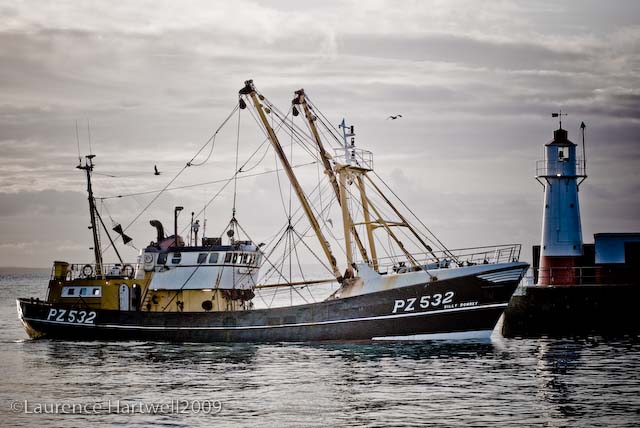Here's one of the two 9 metre beam trawls that are towed by the Newlyn beam trawler Billy Rowney.......
Presenter, Monty Hall describes the trawl gear used by the boat as "fishing on a huge industrial scale".........
at 30 metres how does that compare? that's not a huge industrial trawler........
this is a huge industrial trawler, one of around 30, licensed by the EU to fish off the West coast of Africa.
this is a huge industrial trawler, one of around 30, licensed by the EU to fish off the West coast of Africa.
"Noakchott / Mauritania, 27th of February 2012 – A report released by Greenpeace today highlights the industrial-scale overfishing by European vessels in West African waters as a result of failed European Union (EU) fishing rules (1).
At the same time an international Greenpeace team aboard Arctic Sunrise started its campaign in Mauritania in order to document, profile and protest against European super trawlers emptying West Africa’s waters. The extent and effects of these giant European factory trawlers on the region’s fish stocks and coastal communities are devastating, as the international Greenpeace team reports from Mauritania. http://www.greenpeace.org.uk/blog/oceans/Greenpeacewitnesscostofoverfish...
As a revealing example Greenpeace investigations focus on the Pelagic Freezer-Trawler Association (PFA), a group of companies with 34 vessels under Dutch, German, French, UK and Lithuanian flags, which have obtained millions in subsidies from the EU and European governments. An estimated €142.7 million of European taxpayers’ money was paid to secure fishing rights for PFA vessels in Mauritanian and Moroccan waters between 2006 and 2012. The PFA fleet also received €21 million to increase and modernise its fishing operations between 1994 and 2007. “It is a big decision, but it is unavoidable if we want to secure healthy fish stocks and a sustainable fishery in the years to come: We need to scrap parts of the obese European fleet and fish less, so fish stocks can recover. If overfishing continues like this we will all lose, especially local fishermen who depend on fish as a main source for food”, says Tom Grijsen, Greenpeace oceans campaigner aboard the Greenpeace ship Arctic Sunrise, currently in Mauritanian waters.
Millions of Africans depend on fish caught by local fishermen, but as a consequence of overfishing by the sizeable European fleet stocks are further decreasing. As a result local fishermen are forced to fish further out at sea because the accessibility to stocks for the coast is diminishing. Working conditions have become increasingly dangerous and fishermen face the risk of collisions with industrial trawlers, which causes besides damage, also increased killings of local fishermen. “The European fleet is unfairly competing with artisanal fishermen. It would take 56 traditional fishing pirogues one year to catch as much fish as one super-trawler can capture and process in a single day”, says Grijsen, and continues: “This year governments in Europe have the chance to fix the EU’s broken fishing rules. It is not too late to agree a new rulebook that tackles overfishing and fleet overcapacity head on.”
European governments and fisheries ministers need to assume responsibility now by putting in place a new Common Fisheries Policy (2) that tackles Europe’s bloated fleets, starting by scrapping the most destructive and oversized vessels, including factory trawlers operating in the waters of developing countries. It is vital to stop the subsidised plunder of Africa by abolishing all direct and indirect subsidies that support these destructive and unsustainable fishing practices. "Greenpeace will remain actively campaigning for a radical reform of the CFP, as this is our last chance to turn the tide on overfishing", concludes Greenpeace oceans campaigner Tom Grijsen.
Credit: Pierre Gleizes / Greenpeace


